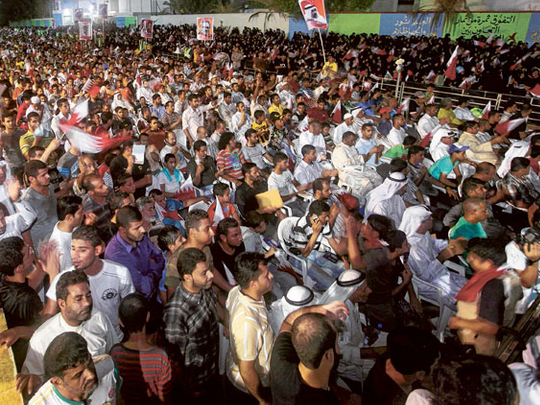
Manama: Bahrain's foreign minister has denied reports that his country had severed its diplomatic ties with Qatar following the airing of a programme by Al Jazeera English deemed offensive by Manama.
"The report about cutting off relations between Bahrain and Qatar is not true and lacks credibility," Shaikh Khalid Bin Ahmad Al Khalifa wrote on his Twitter account. "Relations between Manama and Doha are larger and deeper than a negative television programme. Whoever targets Qatar and its people is in fact attacking his own family," Shaikh Khalid wrote.
An online report on Friday evening claimed that Manama decided to cut off its diplomatic relations with its peninsular neighbour in protest against the broadcasting by the Doha-based Al Jazeera English of a 50-minute programme about the events that have unfolded in Bahrain since February.
Bahrain said that the programme was totally biased.
Al Jazeera criticised
Shaikh Khalid, through his Twitter account, led the chorus of criticism of the channel broadcasting in English, charging that its programme, "Shouting in the Dark" and aired on Thursday, ignored the views of a large segment of Bahraini society.
"It is obvious that there are people in Qatar who do not want good for Bahrain… And the opinionated film on Al Jazeera English is the best example of this puzzling animosity," Shaikh Khalid wrote on his Twitter account. "A one whole-hour of exclusive rights to Al Jazeera English presenting a one-sided view… Dismissing the views of the majority of the Bahraini people.. You deserve an Oscar," he wrote in Arabic on his account followed by around 42,000 people.
Online comments on the programme were expectedly diverse and across a wide spectrum, ranging from those who fully supported it as "an expression of facts and truth" to those who utterly condemned it as "blatant lies and outstanding acting to win compassion."
Neither Bahrain nor Qatar issued an official statement on the issue in an apparent move to ensure it does not grow out of proportions.
According to Middle East Online, Shaikh Abdullah Al Thani, Qatar's ambassador to Bahrain, said that he personally goes well beyond anything that could cause problems between the two countries.
"I have not received anything and if some people want to fuel tension and compound differences, they are looking for an easy way to destroy relations," he was quoted as saying. "I am not one of those who do not wish to bolster bilateral relations and I am well beyond anything that could result in problems. The two countries have successfully settled issues and we never cared about negative developments," Shaikh Abdullah, the dean of ambassadors in Manama, reportedly said.
Fluctuating
Relations between Manama and Doha fluctuated for decades, particularly in the 1980s and 1990s, after they were unable to address a thorny border dispute mainly over Hewar Islands.
The issue was eventually settled in March 2001 by the International Court of Justice in a final, without appeal and binding judgement for both countries.
Relations steadily improved amid pledges of reinforcing cooperation at various levels and the construction of a 41-kilometre causeway to link the two countries was hailed as the most visible bond of friendship.
However, bilateral ties were put to an acid test when Doha refused to endorse the nomination of Mohammad Al Mutawa, Bahrain's former information minister, to the post of secretary general of the Gulf Cooperation Council (GCC) reportedly for his role and statements during the border dispute standoff.
Following successful mediation efforts by Saudi Arabia, Bahrain nominated Abdul Lateef Al Zayani as its new candidate for the rotating position and the nomination was backed by the five other members of the GCC, including Qatar.











